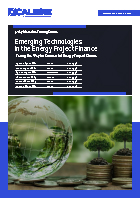| Date | Venue | Fee | |
|---|---|---|---|
| 15 Jun - 19 Jun 2026 | Dubai – UAE | $ 5,950 | Register Now |
| 17 Aug - 21 Aug 2026 | Dubai – UAE | $ 5,950 | Register Now |
| 16 Nov - 20 Nov 2026 | Dubai – UAE | $ 5,950 | Register Now |
| 14 Dec - 18 Dec 2026 | Amsterdam - The Netherlands | $ 5,950 | Register Now |
About the Course
In the modern energy landscape, successful project development and financing require a deep understanding of technological advancements and financial intricacies. This 5-day intensive Emerging Technologies in the Energy Project Finance training course aims to equip delegates with essential knowledge and strategies vital for navigating the complexities of energy project finance and ensuring effective project closure. Focusing on emerging technologies in the energy sector, it explores practical approaches that facilitate the seamless integration of renewable energy sources, energy efficiency measures, and innovative financing mechanisms.
Delegates will learn the comprehensive lifecycle of energy projects, from initial planning and regulatory considerations to risk assessment, financial structuring, and contract management. Understanding the role of equity investors, debt sizing strategies, and due diligence processes will be essential in preparing professionals to undertake successful energy ventures. Moreover, insights into advanced financing techniques such as tax equity structures, green bonds, and public-private partnerships will provide delegates with tools to optimise financial outcomes while adhering to sustainability goals. They will emerge equipped with the expertise needed to manage energy projects from inception through to successful closure, ensuring compliance with regulatory standards, maximising operational efficiency, and achieving long-term financial viability in the energy sector.
Furthermore, this training program emphasizes the technological dimensions critical for project success, including the latest developments in renewable energy technologies, where delegates will gain proficiency in evaluating integration challenges, assessing technological advancements, and applying financial models tailored to renewable energy projects. Energy efficiency strategies, smart grid technologies, and effective energy management practices will be explored to enhance project efficiency and sustainability.
Core Objectives
By the end of the training course, delegates will be able to:
- Equip with a thorough understanding of the complete lifecycle of energy projects
- Understand the regulatory frameworks and permitting processes crucial for energy project development and compliance
- Develop abilities to identify, assess, and effectively mitigate risks associated with energy projects, ensuring project resilience and success
- Optimise advanced financial structuring techniques
- Gain knowledge of various renewable energy technologies
- Familiarise with sophisticated financing strategies like tax equity structures, green bonds, public-private partnerships (PPPs), and risk allocation techniques to optimise financial outcomes in energy projects
- Achieve the skills necessary for seamless project closure
Training Approach
This training course blends theoretical learning with hands-on practical exercises and case studies. Delegates will engage in interactive discussions, simulations, and workshops to apply learned concepts to real-world scenarios. Additionally, expert-led lectures and peer collaboration will enhance comprehension and foster a comprehensive understanding of energy project finance and technological aspects.
The Attendees
This training course is suitable for energy sector professionals, including project managers, developers, financial analysts, engineers, and policymakers.
Likewise, it will be valuable to the professionals but not limited to the following:
- Technology Officers
- Energy Project Managers
- Renewable Energy Developers
- Financial Analysts in the Energy Sector
- Investment Bankers specialising in Energy
- Government Officials involved in Energy Policy
- Engineers focusing on Energy Systems
- Anyone who is involved in Sustainable Energy Practices
Daily Discussion
DAY ONE: ENERGY PROJECT DEVELOPMENT AND FINANCING ESSENTIALS
- Overview of Energy Project Lifecycle
- Regulatory and Permitting Considerations
- Risk Assessment and Mitigation Strategies
- Financial Structuring Techniques
- Capital Stacking and Debt Sizing
- Role of Equity Investors and Project Sponsors
- Due Diligence Process in Energy Projects
- Financial Modeling and Sensitivity Analysis
- Project Execution Strategies
- Contracting Strategies for Energy Projects
DAY TWO: RENEWABLE ENERGY TECHNOLOGIES AND FINANCIAL STRATEGIES
- Solar Photovoltaic (PV) Technology Overview
- Wind Energy Technology Overview
- Biomass and Bioenergy Projects
- Hydroelectric Power Projects
- Geothermal Energy Projects
- Energy Storage Technologies
- Emerging Technologies in Renewable Energy
- Technological Advancements in Renewables
- Integration Challenges in Renewable Energy Projects
- Financial Models for Renewable Energy Projects
DAY THREE: ADVANCED FINANCING TECHNIQUES FOR ENERGY PROJECTS
- Project Financing vs Corporate Financing
- Securitisation and Asset-Backed Financing
- Tax Equity Financing Structures
- Green Bonds and Climate Finance
- Public-Private Partnerships (PPPs)
- Infrastructure Funds and Investment Vehicles
- Role of Multilateral Development Banks (MDBs) in Energy Financing
- Risk Allocation Strategies in Energy Project Financing
- Credit Enhancement Techniques for Energy Projects
- Insurance and Hedging Strategies in Energy Project Finance
DAY FOUR: ENERGY EFFICIENCY STRATEGIES AND MANAGEMENT
- Energy Efficiency Technologies and Practices
- Demand-Side Management Programs
- Building Energy Management Systems (BEMS)
- Industrial Process Optimisation for Energy Efficiency
- Smart Grid Technologies and Applications
- Energy Audits and Retrofits
- Financial Incentives and Rebate Programs for Energy Efficiency
- Performance Contracting Models in Energy Efficiency Projects
- Role of Energy Service Companies (ESCOs)
- Measurement and Verification (M&V) Protocols for Energy Efficiency
DAY FIVE: ENERGY PROJECT CLOSURE AND EVALUATION
- Project Closeout Procedures in Energy Projects
- Final Acceptance Testing and Commissioning
- Handover and Transition to Operations
- Performance Monitoring and Maintenance in Energy Projects
- Stakeholder Engagement and Communication Strategies
- Environmental and Social Impact Assessment in Energy Projects
- Compliance and Reporting Requirements in Energy Projects
- Evaluation of Project Economics and Financial Performance
- Operational Efficiency Analysis in Energy Projects
- Risk Management Post-Closure in Energy Projects
Certificate Awarded
Upon successful completion of this training course, participants will be awarded a Certificate of Completion from XCalibre Training Centre, acknowledging their accomplishment. This certificate serves as a testament to their dedication to developing their skills and advancing their expertise in their respective fields.



